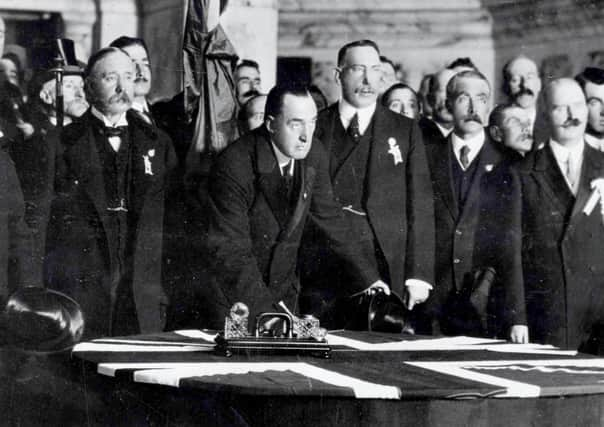NI CENTENARY: ‘Partition was chosen by the people, not imposed by London – and may have prevented great bloodshed’


That is the view put forward by head of the Ulster-Scots Agency yesterday, amid controversy over whether the creation of the state in 1921 is a cause for celebration or not.
Ian Crozier, its chief executive, said that his own organisation is planning events throughout 2021 to mark the birth of Northern Ireland.
Advertisement
Hide AdAdvertisement
Hide AdHe did not wish to directly address remarks from republicans yesterday (such as Michelle O’Neill’s assertion that the basis for Northern Ireland being brought into being was “sectarianism”).
But he did say: “If you go back and look at the discussion at the time, it wasn’t about sectarianism or politics.
“The discussion at the time was about self-determination.
“If you go back and look at, for example, the newspaper archives, you are in a period after the First World War when people from small countries all over Europe were talking about self-determination.”
However he added: “The point that was then also being made was: ‘Well, the same arguments that apply to the self-determination of the Irish people also apply to the self-determination of the Ulster-Scots people.
Advertisement
Hide AdAdvertisement
Hide Ad“Those people exercised their right to ‘self-determine’ away from the rest of Ireland.”
The newly created parliament in Belfast could have opted to unite with the southern counties, but did not.
And therefore nobody can claim that partition was “imposed from London”.
The Ulster Covenant (overseen by Lord Carson in 1912) showed the sheer strength of feeling among Ulster Protestants, Mr Crozier added.
Advertisement
Hide AdAdvertisement
Hide AdAt a time when the entire population of Northern Ireland was roughly 1.2 million, nearly half-a-million people signed the Ulster Covenant – and that was “in an era before modern communication or mass transportation”.
Furthermore, Mr Crozier argued, in the early 1920s the southern counties were largely engulfed by an extremely bloody civil war between pro and anti-treaty sides – and there could have been “a hell of a lot more” violence, stemming from loyalists, if Dublin rule had been imposed island-wide.
“If you’d added another 100,000 armed, angry men to the mix, nothing good was going to come of it,” he said.
READ MORE FROM THIS REPORTER:
Boris Johnson says NI centenary is ‘obvious’ cause for celebration as O’Neill declares state ‘built on sectarianism’
Advertisement
Hide AdAdvertisement
Hide Ad——————
A message from the Editor:
Thank you for reading this story on our website. While I have your attention, I also have an important request to make of you.
With the coronavirus lockdown having a major impact on many of our advertisers — and consequently the revenue we receive — we are more reliant than ever on you taking out a digital subscription.
Subscribe to newsletter.co.uk and enjoy unlimited access to the best Northern Ireland and UK news and information online and on our app. With a digital subscription, you can read more than 5 articles, see fewer ads, enjoy faster load times, and get access to exclusive newsletters and content. Visit https://www.newsletter.co.uk/subscriptions now to sign up.
Advertisement
Hide AdAdvertisement
Hide AdOur journalism costs money and we rely on advertising, print and digital revenues to help to support them. By supporting us, we are able to support you in providing trusted, fact-checked content for this website.
Alistair Bushe
Editor